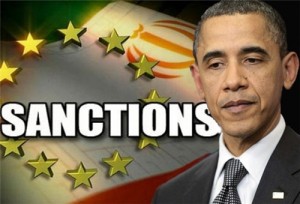 TEHRAN � Iranian lawmakers Friday threatened retaliation for a�Senate�bill that proposes tough new sanctions on Iran if the Islamic Republic fails to cooperate in upcoming�negotiations�aimed at curbing its�nuclear program.
TEHRAN � Iranian lawmakers Friday threatened retaliation for a�Senate�bill that proposes tough new sanctions on Iran if the Islamic Republic fails to cooperate in upcoming�negotiations�aimed at curbing its�nuclear program.Mehdi Moussavinejad, a senior member of the Iranian parliament�s energy committee, said lawmakers were considering a measure that would hike Iran�s uranium enrichment for the current top concentration of 20% to more than 60%, substantially closer to the 90% needed for nuclear weapons fuel.
�Given the method that the other negotiating side � the U.S. in particular � has adopted during the nuclear negotiations, the legislators are working on a bill that will require the government to increase the level of uranium to over 60%,� Moussavinejad told the official Iranian Republic News Agency.
He said the high-grade material was needed �to supply fuel for our ships.�
The lawmaker was reacting to news that 26 senators, including 13�Democrats, had signed on Thursday as co-sponsors of a new sanctions bill, despite furious lobbying from the�White House. The Democrats included Sen.�Charles E. Schumer�(D-N.Y.), the No. 3 Senate Democrat, and Sen.�Robert Menendez�(D-N.J.), who is chairman of the�Senate Foreign Relations Committee.
Obama administration officials have maintained that new sanctions could drive Iran from the negotiating table and strengthen its hard-liners who don�t want a deal with the West.
World powers have been pursuing negotiations with Iran for a decade because they fear, despite Tehran's denials, that it seeks a nuclear weapons capability. Iran contends that its program is for peaceful purposes.
Colin Kahl, a former administration official who backs the White House strategy, noted the Iranian threat and warned on�Twitter�that passage of sanctions would set off a �threat-threat spiral.�
Senior Iranian officials last week threatened to break off negotiations with six world powers -- the United States, Britain, France, Russia, China and Germany -- after the�U.S. Treasury Department�blacklisted several Iranian individuals and organizations in a crackdown on sanctions enforcement. They rejoined ongoing preliminary talks this week, but continued to warn that more sanctions could bring retaliation.
But some sanctions advocates maintain that the Iranian threats are hollow. Iran�s economy is in such desperate need of relief that the government can�t afford to break off the talks, they say.
The threatened sanctions would force further reductions in Iran�s oil sales, to almost zero, and would penalize some sectors of Iran�s economy that so far escaped sanctions. They also seek to set minimum terms for the nuclear deal the six countries are seeking and would require the United States to join in military action to protect Israel it if starts a war with Iran.
At a White House press conference Friday afternoon, Obama took a shot at the 13 Democratic senators who co-sponsored the new sanctions bill, suggesting that their support of the measure was motivated by pre-midterm politics.
�I'm not surprised that there's been some talk from some members of�Congress�about new sanctions,� he said. �I think the politics of trying to look tough on Iran are often good when you're running for office or if you're in office.�
But Obama said that more sanctions could destroy upcoming� negotiations with Iran and put the U.S. on a path to war that most Americans don�t want.
Some Democratic lawmakers acknowledge privately that they fear they could be attacked as soft on Iran and insufficiently supportive of Israel if they don�t support sanctions legislation.
By Los Angeles Times�
The Iran Project is not responsible for the content of quoted articles.










